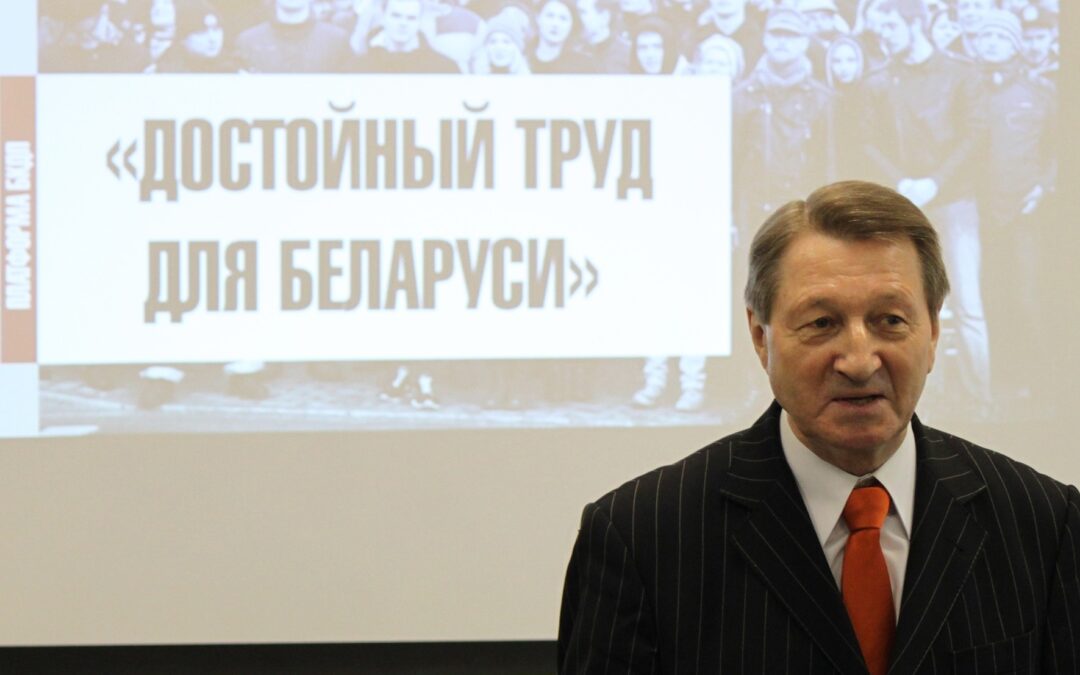
Dec 5, 2022
In the wake of a new wave of prison sentences against union leaders and other activists arrested earlier this year, new Belarus worker rights organization Salidarnast is tracking and disseminating updates on union political prisoners’ legal cases, and providing other worker rights news.
Belarusian Congress of Democratic Trade Unions (BKDP) President Aliaksandr Yarashuk, jailed since April and facing 14 years in prison, was elected in absentia to an ITUC vice-presidency at the organization’s 5th World Congress last month, reports Salidarnast.
Other updates include:
- Extraordinary mistreatment of two jailed union leaders, Leanid Sudalenka and Volha Brytsikava, for which Brytsikava reportedly started a hunger strike on November 8 and was released last week after having spent more than 105 days behind bars this year–including 75 consecutive days in the spring
- Continuation of a ten-person trial associated with worker organization Rabochy Rukh for which the accused are facing prison sentences of up to 15 years for high treason, among other charges
- Grodno Azot fertilizer factory worker and chairperson of the independent trade union there, Andrei Khanevich, whose phone was tapped by Belarusian special service, sentenced to five years in prison for speaking with a BelSat TV reporter
- Belarusian Independent Trade Union (BNP) Vice Chairperson and Chairperson of the Local Trade Union at Belaruskali fertilizer factory, Aliaksandr Mishuk—detained since May—sentenced to two and a half years’ imprisonment
- Free Trade Union of Metalworkers (SPM) Deputy for Organizational Work Yanina Malash—mother of a minor child and detained since April—sentenced to one and a half years’ imprisonment
- Vital Chychmarou, a former engineer fired in 2020 for trade union activities and manager of an SPM organization, sentenced to three years of home confinement
- Free Trade Union of Metalworkers (SPM) Trade Union Council Secretary Mikhail Hromau—detained since April—sentenced to two and a half years of home confinement
- Genadz Bedzeneu, who attempted to start a local union for Polotsk stall market workers, arrested.
Salidarnast is filling an information void created after the Lukashenko government in July forcibly shut down the BDKP and its affiliates, compounded by the detention of dozens of journalists and media workers with other civil society defenders. The number of political prisoners in Belarus stood at almost 1,500 in November, reports the European Federation of Journalists (EFJ); up from 1,000 in February. The Belarus Supreme Court in July dissolved the BKDP and its four affiliates: BNP, the Union of Radio and Electronics Workers (REP), Free Trade Union of Belarus (SPB) and SPM.
Salidarnast on December 1 flagged the arrest of at least five people at the Miory steel plant, warning of imprisonment risk for up to ten thousand people who contributed to the “Black Book of Belarus” which identified riot police.
“Despite the destruction of the independent trade union movement, workers in Belarus remain the force which can resist the dictatorship,” says Salidarnast.
The repression and eventual dismantling of the independent Belarus union movement began after hundreds of thousands of people, often led by union members , many of them women, took to the streets in 2020 to protest elections in which President Alexander Lukashenko declared himself winner in a landslide victory amid widespread allegations of fraud. The BKDP—the first Belarus union to be independent of government influence in the post-Soviet era—was founded 29 years ago and has been a member of the International Trade Union Confederation (ITUC) since 2003.
Hear more about workers’ fight for freedom by listening to a Solidarity Center podcast interview in which now-imprisoned BDKP Vice President Sergey Antusevich in 2021 spoke passionately about workers taking to the streets in defense of democracy. Antusevich has been jailed pending trial since April 2022.
(You can support jailed Belarusian union leaders—take action here).
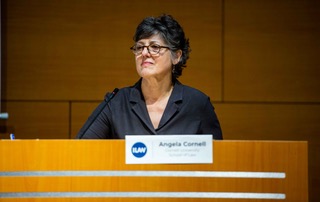
Oct 9, 2022
As the world witnesses some of the greatest challenges to democratic governments since the 1930s, unions offer a strong and essential counter to the trend, according to Cornell University Professor Angela Cornell.
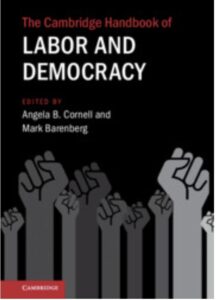 “Many studies show that organized labor has played critical role in developing and defending democracy. The organized working class was the primary carrier of democracy,” Cornell said today at the International Lawyers Assisting Workers Network (ILAW) Conference opening plenary.
“Many studies show that organized labor has played critical role in developing and defending democracy. The organized working class was the primary carrier of democracy,” Cornell said today at the International Lawyers Assisting Workers Network (ILAW) Conference opening plenary.
Cornell, co-editor of The Cambridge Handbook of Labor and Democracy, along with several book contributors, opened the Conference’s third and final day with a discussion of the handbook, an interdisciplinary and cross-regional anthology. (Hear Cornell and ILAW Board member Mery Laura Perdomo discuss unions and democracy on a recent Solidarity Center Podcast.)
More than 130 labor lawyers from 42 countries meeting October 7–9 also focused their final day on developing plans for Network’s coming years.
The Solidarity Center launched the ILAW Network in December 2018 as a global hub for worker rights lawyers to facilitate innovative litigation, help spread the adoption of pro-worker legislation and defeat anti-worker laws.
Unions Fuel Democracy
More than one quarter of the world’s population now live under democratically backsliding governments, including some of the world’s largest democracies.
Cornell listed the ways in which unions fuel democracy, including by providing a counterviling role to corporate power.
Further, said Cornell, “new research on the role of unions and in building solidarity among their members demonstrates the ways in which unions can bridge racial and national divides. Union members are less likely to support extreme views.”
Economic inequality is a destabiizing influence in most countries, Cornell said, and unions decrease inequality.
“Unions have been instrumental in the passsage of labor protections and the social safety net, including social security, minimum wage and overtime, workplace heath and safety and medical leave, among others.”
Unions Build Democracy in Latin America, Africa
Ken Roberts, a professor at Cornell University and book contributor, overviewed how unions have been bulwarks of democracy throughout Latin America.
“Labor has played a central role in trying to restore citizenship rights,” said Roberts. Since the 1960s–1980s, when unions suffered setbacks during military dictatorships and neoliberal reforms that prioritized the interests of the wealthy over working people, the key challenge has been to build broad coalitions, he said.
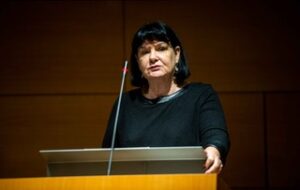
ITUC General Secretary Sharan Burrow
By joining with other movements, indigineous communities and territorially-based urban community networks, unions have created strong and successful coaltions. Since late 1990s as part of social pushback against neoliberal model, 14 countries have elected progressive governments and labor has been an important part of moving this unprecedented number of elections, he said.
Most recently, unions were part of successful coalitions that elected progressive governments in Honduras and Colombia and are constructing broad democratic fronts against new challenges from ethnonationalist and extreme conservative groups.
In Africa, “more often than not, unions were the only force fighting decolonization,” said Evance Kalula, chair of International Labor Organization (ILO) Committee on Freedom of Association and emeritus prof of law at the University of Capetown. “Formal and informal collaboration between unions as agents of change and nationalist movements.”
Kalula and co-author Chanda Chungu, contributed the chapter on “African Perspectives on Labor Rights as Enhancers of Democratic Governance.”
Julia Lopez Lopez, a professor at the University of Barcelona, described how unions are standing up to corporations that are using the new model of app-based work to exploit transportaton workers.
“The case of transport sector is one of the cases that show unions are trying to create new strategies against market intervention against multinational efforts to liberalize labor rights,” she said.
Lopez recently participated in research projects on precarious work and social rights led by the Working Lives Research Institute.
Closing the Conference, Sharan Burrow, general secretary of the International Trade Union Confederation (ITUC), overviewed the challenges facing workers and their advocates and pointed to recent legal successes as well, including an agreement that the ITUC and ILO achieved with the Qatar government that ensures more rights for migrant workers, including the freedom to leave their jobs and seek alternative employment.
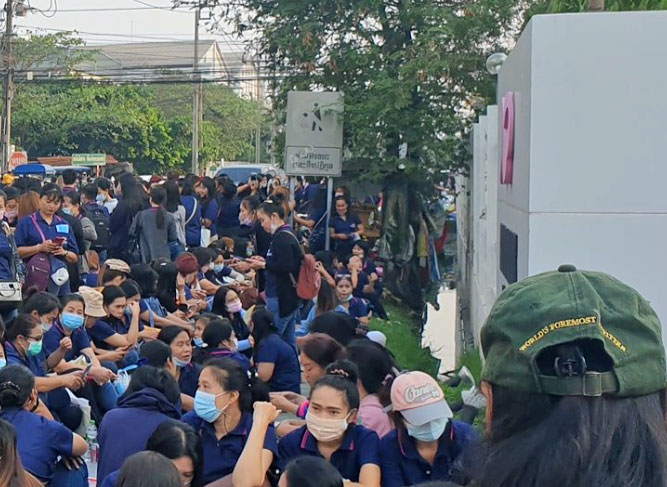
May 25, 2022
Agreement, the Largest Wage-Theft Settlement at a Garment Factory, Follows Year-Long Advocacy by International Labor Rights Advocates
The Solidarity Center and the Worker Rights Consortium (WRC) announced today that more than 1,250 Thai workers who sewed bras for Victoria’s Secret, Lane Bryant, and Torrid—and who were fired in 2021 without their legally mandated severance—have received $8.3 million (281 million baht) in compensation. The groups credited the decision of Victoria’s Secret to finance the payments, via a loan arrangement with the workers’ former employer.
Sycamore Partners, the parent of Lane Bryant and Torrid, did not contribute.
“This is a huge victory for the workers and a testament to the courage of their union and the strength of the international solidarity campaign that supported them,” said David Welsh, Thailand country director of the Solidarity Center. “Low-wage garment workers left destitute by injustice meted out by global supply chains is nothing new. What’s new is they did not accept their fate—and won. We also hope this represents a model for the type of domestic, governmental, international and brand engagement to resolve future cases where garment workers are left in similarly desperate straits. It’s an historic case given the amount of the settlement and again, hopefully, a model for the global garment industry going forward in terms of direct brand involvement’.
The workers are represented by the Triumph International Union, affiliated with the Confederation of Industrial Labour of Thailand.
“Our organization has documented hundreds of cases of wage theft in the apparel supply chain,” said Scott Nova, Executive Director of the WRC. “This was the largest theft—and now the most back pay—we’ve ever seen at an individual garment factory. The $8.3 million provided by Victoria’s Secret is also the most any brand has ever contributed to help resolve a wage theft case.”
After the Brilliant Alliance factory closed in March 2021, the Thai government ordered its owner, Hong Kong-based Clover Group, to pay severance within 30 days. Clover refused, telling the factory’s 1,250 low-wage workers it had no money and they should agree to wait 10 years to be paid in full.
With the Solidarity Center’s support and advocacy, the union launched a campaign demanding their severance pay. The WRC and Solidarity Center engaged Victoria’s Secret and Sycamore, pressing them to ensure the workers were paid. The WRC identified other brands that did not use Brilliant Alliance, but had influence over Clover and over a key business partner, Brandix, a Sri Lankan apparel supplier: American Eagle Outfitters, Gap, and PVH. After months of efforts, including campaigning by Clean Clothes Campaign, Remake, and other nonprofit worker advocacy organizations participating in the global #PayYourWorkers coalition, Clover agreed to pay the workers and Victoria’s Secret committed to finance the payments, via a loan to Clover. Last week, all workers received their severance, plus over one million dollars in interest, per Thai law.
Sycamore Partners ignored entreaties and did nothing to support the workers.
“Many of the workers were at the factory for well over a decade and they earned very substantial severance,” said Welsh, noting that the average Brilliant Alliance worker received the equivalent of more than two years’ wages and some received as much as four years’ pay.
“The severance these workers earned was effectively their life’s savings,” said Nova, “stolen from them when they were fired and now restored.” He continued, “Victoria’s Secret should be very proud of what it has done here. The people who run Sycamore Partners should hang their heads in shame.”
###
The Solidarity Center can arrange worker interviews upon request.
Notes:
- While most garment-producing countries require severance, non-payment is a chronic problem in the apparel industry. For more information on severance theft, see Fired, Then Robbed: Fashion brands’ complicity in wage theft during Covid-19, available here.
- Before closing Brilliant Alliance, Clover Group formed a partnership with Sri Lanka-based Brandix, one of the world’s largest clothing manufacturers. All of Clover’s factories were included in the new company, except Brilliant Alliance, allowing Clover and Brandix to profit from Clover’s assets and its ongoing brand relationships, while the Brilliant Alliance workers went unpaid.
- Hundreds of civil society organizations, including trade unions and labor rights groups, along with the Solidarity Center and the WRC, have endorsed #PayYourWorkers, an effort to press apparel brands to join with unions to create a global severance guarantee fund, thereby putting an end to severance theft in the global apparel industry.



 “Many studies show that organized labor has played critical role in developing and defending democracy. The organized working class was the primary carrier of democracy,” Cornell said today at the International Lawyers Assisting Workers Network (
“Many studies show that organized labor has played critical role in developing and defending democracy. The organized working class was the primary carrier of democracy,” Cornell said today at the International Lawyers Assisting Workers Network (
